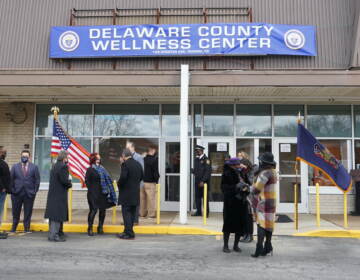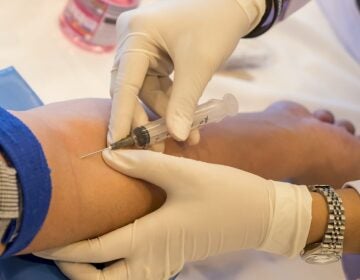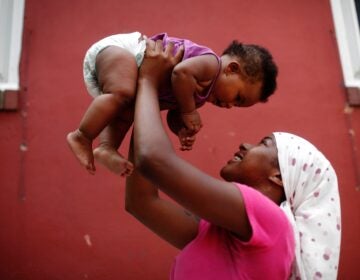Rushing a COVID-19 vaccine
Scientists are racing to develop a COVID-19 vaccine, but a Philly expert says it takes years to do safely and outlines the risks of rushing the process.
Listen 12:57
Jennifer Haller (left) is given the first shot in the first-stage safety study clinical trial of a potential vaccine for the COVID-19 coronavirus by a pharmacist, Monday, March 16, 2020, at the Kaiser Permanente Washington Health Research Institute in Seattle. (AP Photo/Ted S. Warren)
Pennsylvania, New Jersey and Delaware are all moving to partially reopen. But health experts say only a COVID-19 vaccine can get us back to life (mostly) as we knew it, so scientists and pharmaceutical companies around the world —including some right here in the Philly area — are racing to make one ASAP.
Dr. Paul Offit, who directs the Vaccine Education center at the Children’s Hospital of Philadelphia, is on a national panel overseeing vaccines being developed by American companies. He explains why vaccines take years to develop safely and why he urges companies “crowing” about their latest developments to be more humble.

Hear the whole story on The Why
Interview highlights
On his own experience developing a successful vaccine
I was fortunate enough to be part of the team at Children’s Hospital Philadelphia that created the rotavirus vaccine — rotavirus is a cause of fever, vomiting and diarrhea. It caused about 75,000 children in the United States to be hospitalized with dehydration, meaning water loss … To prove that our vaccine was safe and effective, we did a prospective placebo-controlled trial of 70,000 people. So 350,000 infants got the vaccine, 35,000 infants got a placebo vaccine. And then we did that study in 11 countries. It took four years to do. It cost about probably $350 million. And then, when the code was broken and we saw who got the vaccine, who didn’t, we realize that our vaccine was highly effective and safe. But that’s the way that it was proven to be, a four-year, 70,000-plus infants study.
On pharmaceutical companies claiming they’re close to a vaccine
I wouldn’t say any vaccine has the lead. I think [Massachusetts-based] Moderna has the lead in press releases, but … all these programs are very early in their development … This is being done quickly for a virus that we don’t know a lot about, or at least that continues to surprise us, so I really wish companies would stop saying when this vaccine is going to be out, because they don’t know that yet. Why don’t we just do this one step at a time, do it carefully and let’s see what we find before we start crowing into the microphone?
On how drug trials have changed since the 1960s
The consent form was a 3-by-5 index card, which said, “I allow my child to participate in a blank vaccine trial …” and then the person would sign it at the bottom. Today, consent forms are about 15 pages long, single-spaced, so it’s a different time. The licensure process has gotten gotten more rigorous. The regulatory process has gotten more specific and harder — which is good because we want to make sure that … it’s held to a very high standard of safety ... I mean … if you have cancer, you’re willing to accept a drug that itself could kill you. Chemotherapy, that itself could kill you. It’s very different when it comes to vaccines. You’re giving them to healthy people, so the worst thing you could do there is to do harm.
WHYY is your source for fact-based, in-depth journalism and information. As a nonprofit organization, we rely on financial support from readers like you. Please give today.






